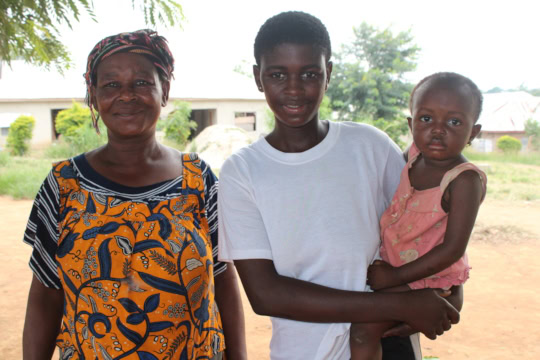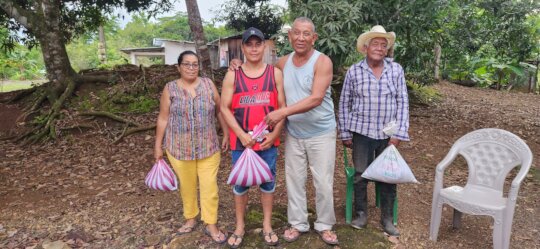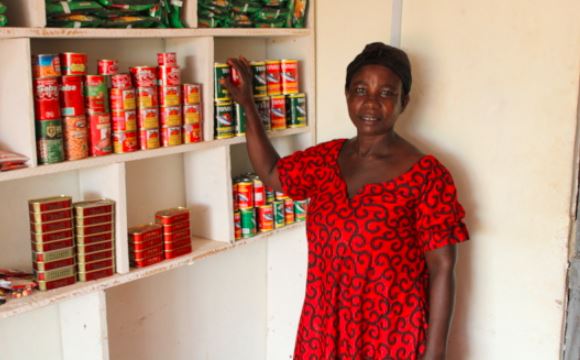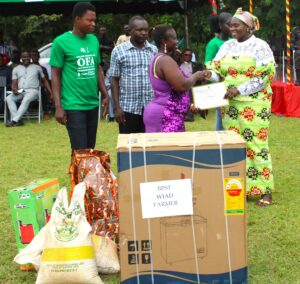Partnering for Healthier, Hunger-Free Communities

Asking questions during women’s health training
By August 2017, Self-Help International Teen Girls Club had been operational for a year with a goal helping teen girls stay in school and complete their formal education. Unplanned pregnancies are a leading cause of girls dropping out of school, and often dooms them to a lifetime of rural poverty. Self-Help has been leading workshops for the Teen Girls Clubs including such topics requested by the participants, their mothers, and community leaders such as reading, community clean up, citizenship, and reproductive health education. The basic education initially offered was insufficient for some young women, and women of all ages in the villages we serve began asking for more comprehensive family planning services. We knew that women’s health was critical to the health of the whole family – particularly if they’re the only breadwinner and only earn income on days they’re healthy enough to work – yet the technical knowledge required was beyond our areas of expertise. We needed a partner who could offer high quality education and affordable services by trained health professionals.
Despite determined efforts, initial inquiries to potential local collaborators were fruitless. In Ghana, efforts by local community development organizations with similar goals to partner each other are often met with skepticism and yield few results due to a perception that the organizations are competing rather than complementing each other’s role. Yet against the odds, today we are pleased to be partnering with a professional health body in Ghana to deliver the needed health services to our cherished communities.
In August 2017, while visiting Ghana, our executive director called a meeting of Self-Help International and Marie Stopes International staff. At the meeting, she laid bare the mission and vision of Self-Help International, and listened to the vision and mission of Marie Stopes International. The team at Marie Stopes International (MSI), led by Stella, was already well aware of the numerous connections between women’s health and the health and financial well being of the children and family. They came to the conclusion that if MSI could offer health services in villages where SHI was already actively supporting women’s micro-credit groups and teen girls clubs, we would both better achieve our ultimate goals of a healthy and hunger-free world. MSI graciously accepted the invitation to partner and indicated their readiness to work with Self-Help International.
On August 11, a team of health workers from MSI provided education and screening on reproductive health for SHI micro-loan beneficiaries during a leadership summit held in the village of Bedabour. During the leadership summit, the village and religious leaders present learned about MSI and the requests of their community members to access quality health services, and pledged to support of such endeavors.
On Thursday, October 19, a team of four health workers led by Stella organized a talk program on reproductive health and teenage pregnancy for thirty (30) students who are members of SHI Teen Girls Clubs and their parents at Timeabu. Stella, a midwife, spoke to the girls about teenage pregnancy; how teenage pregnancy occurs and the dangers in childbirth as a teenager. She advised the girls to stay in school and focus on their studies so as to have a brighter future. Stella also advised the parents that, should the unexpected happen and their teenage daughters get pregnant, they should bring them to the hospital and never neglect them. The parents were receptive and took advantage of the occasion to advise their children to pay attention to everything they are taught.
Stella and her team repeated the education and training on Friday, October 20, in Bedabour. Teenage girls from Bedabour and Beposo converged in Bedabour for health training. In all, ninety-five (95) women and girls attended the training at Bedabour. The talk was on teenage pregnancy and its effects on young mothers. Unlike girls from Timeabu, the girls from Bedabour and Beposo said they felt pressured to have amorous relationship with the men for financial rewards. It came up that some parents in the community have taken their daughters to local chemical sellers and herbalists for unsafe abortions. A bit shocked, Stella and her team advised about the dangers of unsafe abortion which can lead to the removal of the womb and leave a woman barren, and discussed resources where the girls and parents can turn to for help if faced with such a situation. After the talk, MSI offered free screening services to ten (10) women who requested further attention.
It was clear from listening to the mothers and daughters in these three villages that access to ongoing health services and advising from medical professionals was a previously unmet need that was in high demand by the rural communities. A series of such education and screening services are planned for 2017 and Marie Stopes has requested that we submit plans to continue to partner with them for health education and services in 2018.
No doubt, this partnership will go a long way to ensure that mothers are able to receive financial support to start and expand their businesses, generate income so they can take good care of their families, invest in educating their daughters as well as their sons, and enable their girls to be mindful of manageable family sizes, avoiding diseases, and well prepared to welcome a child when the time is right.
Thank you for your support of women and girls in rural communities. You are truly creating brighter futures for generations to come!




